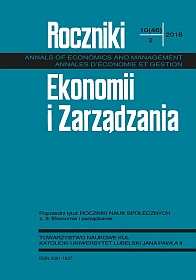The Essence and Significance of the Shadow Economy in the European Union Member Countries
Abstract
The shadow economy is a diverse concept and encompasses a series of phenomena whose common feature is the fact that it is beyond the control of the state. The complexity of the definition of the shadow economy also has its consequences, among others in its proper measurement and creating precise mechanisms aimed at combating it. The underground economy is constantly changing and adapting to current market conditions. In particular, the latest changes in the ways of working and business models, the development of the digital economy, wider social changes and globalization make new activities appear in the shadow economy and some existing ones expand their intensity and scope. They can create new social problems and may potentially undermine tax compliance in a wider scope. Therefore, the aim of this publication is to diagnose the main areas of activity in the shadow economy, with simultaneous indication of the causes and economic effects of its functioning and to determine the importance of the shadow economy in the EU member states.
References
Bagachwa M.S.D., Naho A., Estimating the Second Economy in Tanzania, “World Development” 1995, No. 23(8), pp. 87-99.
Działania organów kontroli skarbowej i organów służby celnej w celu ograniczenia szarej strefy w gospodarce, Najwyższa Izba Kontroli, Warszawa 2017.
Emerging from the Shadows. The Shadow Economy to 2025. Report the Association of Chartered Certified Accountants 2017.
Erdinç Z., The Reasons of Underground Economy, Its Results, Methods and the Turkish Case, “Journal of Business & Economic Policy” 3(2016), No. 1.
Fundowicz J., Łapiński K., Peterlik M., Wyżnikiewicz B., Szara strefa w polskiej gospodarce w 2016 roku, Instytut Badań Nad Gospodarką Rynkową, Warszawa 2016.
Fundowicz J., Łapiński K., Wyżnikiewicz B., Szara strefa 2018, Instytut Prognoz i Analiz Gospodarczych, Warszawa 2018.
Medina L., Schneider F., Shadow Economies Around the World: What Did We Learn Over the Last 20 Years?, “IMF Working Paper” 2018, No. 18-17.
Przeciwdziałanie szarej strefie w Polsce poprzez efektywny wymiar sprawiedliwości, UN Global Compact Network Poland, Warszawa 2016.
Schneider F., Estimating the Size of the Danish Shadow Economy Using the Currency. Demand Approach: An Attempt, “Scandinavian Journal of Economics” 1986, No. 88(4), pp. 643-668.
Schneider F., Estimating the Size of the Shadow Economies of Highly-developed Countries: Selected New Results, CESifo DICE Report 2016, No. 4, p. 48.
Schneider F., The Shadow Economy in Europe, AT Kearney, Visa 2013.
Shining Light on the Shadow Economy: Opportunities and Threats, OECD 2017.
Smith P., Assessing the Size of the Underground Economy: The Canadian Statistical Perspectives, “Canadian Economic Observer” 1994, No. 11-010, 3.16-33, 18 March.
Tanzi V., Corruption, Governmental Activities, and Markets, “IMF Working Paper” 1994, No 99, pp. 1-20.
Wyżnikiewicz B., Nikt nie wygrywa z szarą strefą gospodarczą, https://www.obserwatorfinansowy.pl [dostęp: 09.12.2015].
Copyright (c) 2018 Roczniki Ekonomii i Zarządzania

This work is licensed under a Creative Commons Attribution-NonCommercial-NoDerivatives 4.0 International License.


